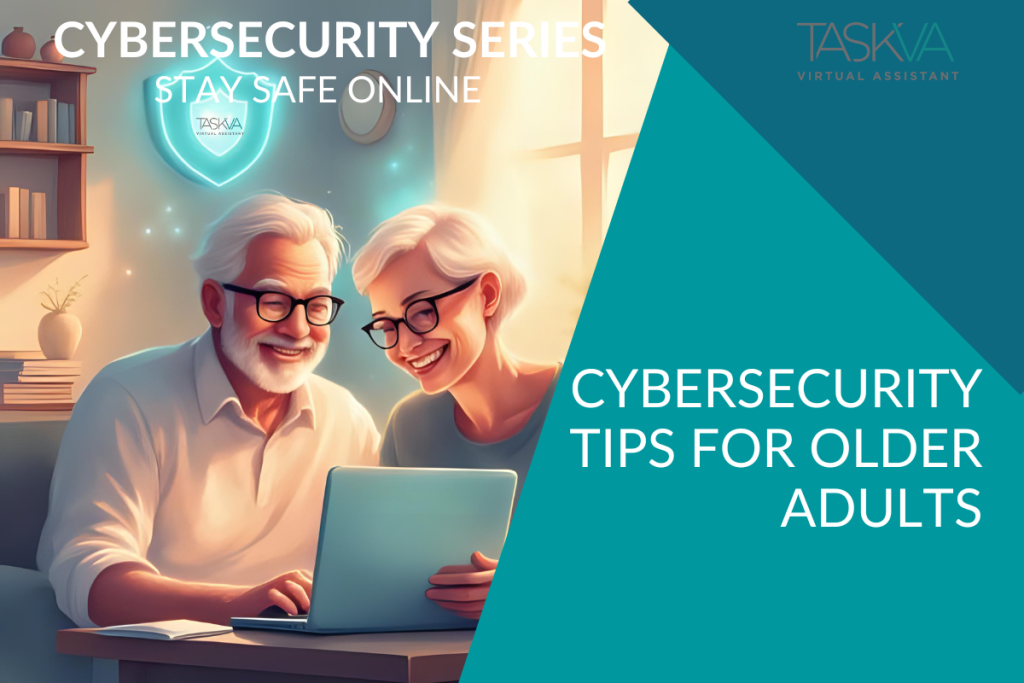
Stay Safe Online: Cybersecurity Tips for Older Adults

More and more, we hear about older adults being targeted by cybercriminals. You’ve probably seen the headlines: “Scammers Target Seniors with Fake Social Security Calls” or “Charity Scam Tricks Older Adults Out of Thousands.” Sadly, it’s not just headlines—it’s happening every single day.
Older adults are prime targets because scammers believe they’re
- Less familiar with technology
- More trusting
- Often willing to help when asked
According to the 2025 Cybersecurity Attitudes and Behaviors Report, older adults report higher levels of uncertainty when identifying scams, making them particularly vulnerable.
But here’s the good news: with awareness and simple habits, older adults can enjoy the benefits of being online—without falling for criminals’ tricks.
First, let’s break down the scams you and your loved ones should watch out for:
- Social Security & Medicare Scams
Fraudsters call or email pretending to be from the SSA or Medicare, claiming there’s a problem with benefits or requiring “urgent verification.” - Charity Scams
Criminals take advantage of generosity, especially after natural disasters or around the holidays. They create fake charities and pocket the money. - Romance Scams
Online “relationships” where the scammer builds trust, then asks for money for emergencies, travel, or “business investments.” - Tech Support Scams
A pop-up claims your computer is infected and urges you to call a number. On the call, scammers request remote access or payment. - Grandparent Scam
An urgent call: “Grandma, I’m in trouble—please send money.” The emotional hook gets people to act without verifying.
🚩🚩Red Flags Older Adults Should Know🚩🚩
Teach older adults to pause if they see these warning signs:
🚩Pressure to act immediately.
🚩Requests for payment by gift card, wire transfer, or cryptocurrency.
🚩Caller ID that looks official but feels “off.”
🚩Emails or texts with poor grammar or unusual requests.
🚩Messages requesting sensitive information, such as SSNs, Medicare numbers, or passwords.
The #1 tip? Slow down. Scammers thrive on urgency.
Building Safer Online Habits
Help your loved one build safer Online habits with these simple practices that are easy to adopt:
- Never share personal info over the phone unless YOU initiated the call.
- Hang up and call back. If someone says they’re from Social Security, hang up and call the official phone number.
- Ignore pop-ups. No real tech support service will ask you to call them from a pop-up.
- Use strong passwords. Encourage password managers to reduce the overwhelm of remembering them all.
- Enable multifactor authentication. It adds an extra layer of security to accounts.
Think of these as digital seatbelts—small habits that make a huge difference.
Getting your loved one to adapt can be challenging. Sometimes adult children or caregivers try to “take over” technology, which can frustrate older adults. Instead:
- Offer gentle coaching. Sit down and walk through an example scam email together.
- Use stories. Share a real-life scam story to make it relatable.
- Set up alerts. Many banks let you enable text alerts for transactions, adding peace of mind.
- Encourage questions. Make it safe for older adults to ask, “Does this look right?” without judgment.
Cybersecurity isn’t about fear—it’s about empowerment.
Scammers thrive on silence. When older adults feel comfortable asking for help, scammers lose their power.
You can help by encouraging older adults to:
- Attend local workshops on online safety (many libraries host them).
- Sign up for the free AARP Fraud Watch Network.
- Use tools like password managers or call-blocking apps.
Scammers don’t just steal money—they steal peace of mind. By sharing knowledge and practicing safe habits, we can help older adults enjoy the internet without fear.
Remember: Cybersecurity isn’t just for businesses. It’s for all of us—including the people we love most.
A Simple Checklist for Older Adults
Print the checklist below and keep it near the computer or phone—it’s a handy reminder.
Stay Safe Online
✅ Never give personal or financial info to strangers
✅ Hang up on suspicious calls and call back official numbers
✅ Avoid sending money via gift cards or wire transfers
✅ Ask a trusted family member before acting on urgent requests
✅ Keep devices updated with the latest software
